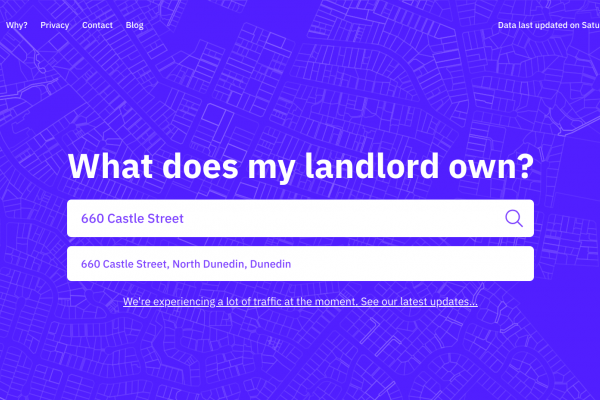“What Does My Landlord Own?” came online last Wednesday, allowing users to enter an address and see all other properties tied to that owner. It uses publically available data, but nonetheless the Privacy Foundation has called for it to be taken down.
The website saw 75,000 searches in the first 48 hours. But currently, if you google it, you won’t find what you’re looking for. It doesn’t show up in the search results. Fear not, you can access the website directly via this link: https://whatdoesmylandlordown.org/
Critic Te Ārohi snagged an interview with one of the websites’ developers, Jordan*. Jordan said that the motivation for making the website came from the common experience of feeling hopeless in the Aotearoa housing market, where he and his mates “foresee no way of home ownership [themselves]”.
According to the website, the tool provides an “understanding of the wealth divide and pathways for collective responses.” A bit like knowing the rules before you break them, the website states that “in order to hold power to account, we must first understand this power.”
This may have worried some, as it makes it crystal clear just how uneven Aotearoa’s properties are divided; a cursory search for flats on Queen Street revealed that one landlord has hoarded over 40 properties in the neighbourhood, while the students living in these flats pay exorbitant rents. These rents, of course, can be used by the landlord to mortgage yet another property and expand his list.
The website has been “much more popular than we thought it would be”, said Jordan. However, the rush of people wanting to know just how many properties their landlord owns (and therefore how diminished the importance of fixing their leaky ceiling is) has led to some serious slowdown. “The traffic increased late Wednesday and has been maxing out the server ever since,” said Jordan.
It’s also not a perfect design. Stuff reported yesterday that while the website seemed accurate based on their searches, it could also erroneously combine multiple property owners with the same name, or claim that someone who owns a bit of a real estate block actually owns the entire thing. This, according to the Privacy Foundation, “poses a very real risk to people’s safety and reputation.” James, a student who we interviewed about the website, said “the only very real risk I’m seeing is the risk of me never owning a home because some fucking Aucklander bought them all.”
The Land Information New Zealand (LINZ) database is publically accessible, but “not a lot of people were aware that their information was in a database,” said Jordan, and it seems to have spooked some. Jordan told Critic Te Ārohi that they aim to address these concerns: “We have a responsibility”. In fact, the team behind the website has already been in correspondence with LINZ and the Privacy Commissioner.
Aotearoa has had landlords since it was colonised in the mid-1800s. The website states that “since colonisation, systems of private land ownership have been continually used to entrench power structures, to benefit a minority.” In practice, this wealth hoarding can be seen through multi-property empires. However, “one of the ways in which the wealthy avoid being challenged is through concealment, which enables them to downplay the power they have.”
Traditionally, all the money syphoned off of Queen or Castle Streets has gone into some anonymous pocketbook. It was unclear who exactly was benefiting from this - until now.
*Name changed.






